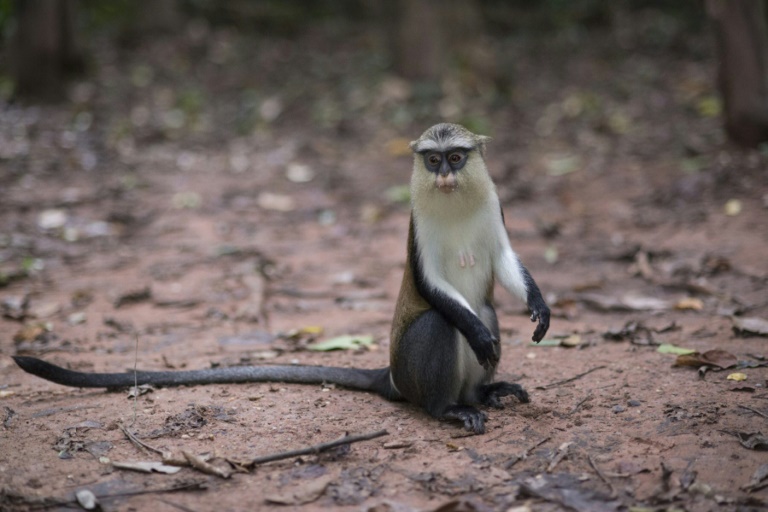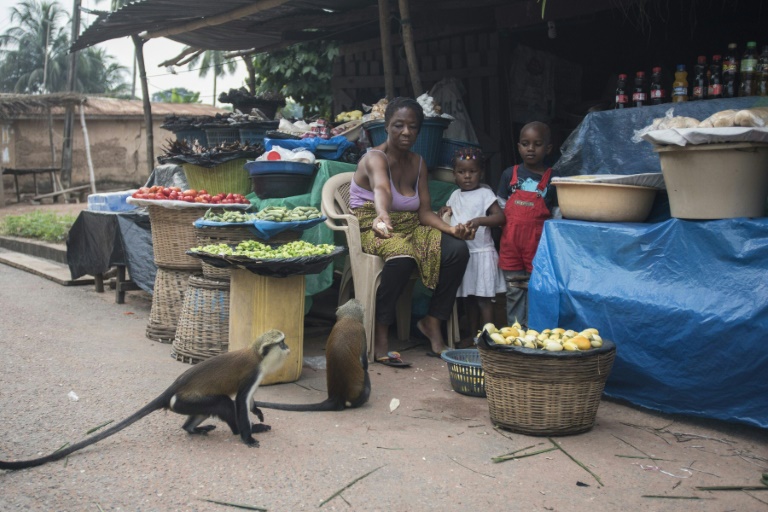Dricus du Plessis title defence on hold following injury rumours?
But they have also turned that reverence into revenue, by making the cheeky primates part of an eco-tourist attraction that benefits both animals and locals alike.
Francis Acquaye, the manager of the Tafi Atome Monkey Sanctuary and Cultural Village, said the monkeys and the forest were considered sacred until the 1980s, when the spread of Christianity eroded traditional beliefs.
The red, brown and white monkeys, which are found between Ghana and Cameroon, were soon hunted and trees were chopped down until the village became an eco-tourist attraction in 1996.
Now, thousands of people visit the sanctuary near the border with Togo each year. Some stay in the village to learn about rural life.
The money earned has helped to build a health clinic, sink boreholes and renovate school buildings.
“People in the community treat the monkeys in a very friendly way just because of the benefits we derive from tourism,” Acquaye told AFP. “Everybody supports what is here.
“So the monkeys are our friends, they are our brothers and sisters.”
– ‘Living together as one’ –
At the sanctuary, monkeys wait in the trees, watching a group of young visitors. When the bananas come out, so do the monkeys. Both tourist and monkey squeal with delight as the food is taken.
Seventeen-year-old Melissa Fehr, from Canada who is among the visiting group, is just as enthusiastic about the warm welcome extended to them by the villagers.
“They all say ‘welcome’ to you, which is really cool,” she enthused.
Villagers say they have never experienced or seen the monkeys attack.
Acquaye walks through the forest calling the monkeys with pursed lips. When they see the halved bananas in his hands, they bound over.

When the bananas come out at Ghana’s Tafi Atome Monkey Sanctuary, so do the monkeys – to the delight of both tourist and monkey
And when people carry food on their heads, especially if it’s bananas or corn, they need to be wary, he said.
“You need to give pieces of those to the monkeys otherwise you will be carrying monkeys on the load (too),” he added.
For Lydia Osei, a trader in the village who sits on the roadside selling drinks and snacks, sharing food with the monkeys is a normal part of life in Tafi Atome.
“We give them food when we have it. We give them banana and maize and other things and they are no longer afraid of us,” she said.
“Even though they are animals and we are humans, we are living together as one.”
– ‘Significant potential’ –
The Tafi Atome sanctuary is one of a handful of successful eco-tourism projects across Ghana that aim to protect the region’s culture and environment while providing resources to local communities.
Others include a hippopotamus sanctuary in the north of Ghana, guided hikes alongside waterfalls in the east and along the coast, turtle-watching tours are set up to conserve the endangered species.
A recent report by the Oxford Business Group research consultancy said that even though it was still in its early stages, eco-tourism in Ghana had “significant potential” as the number of overseas visitors to the country increases.
The World Bank said 897,000 international tourists visited Ghana in 2015.

Ghanaian tourism experts now want to see more emphasis on eco-tourism projects like Tafi Atome
But the World Travel and Tourism Council (WTTC) estimates that the numbers could reach nearly 1.3 million this year and more than 2.0 million by 2027.
The travel and tourism sector directly generated 288,000 jobs in 2016 and is forecasted to grow by 4.7 percent in 2017 to 301,500.
By 2027, travel and tourism will account for 366,000 jobs directly, it added.
– ‘Be proud of your culture’ –
Ghanaian tourism experts now want to see more emphasis on eco-tourism projects like Tafi Atome.
The co-founder of tour operator Sunset African Tours, Naa Oyoe Ofei-Aryeh, said people are currently more likely to visit the slave castles along Ghana’s coast or attend cultural festivals.
A push by local government could get more people involved, she added.
Apollo Panou, the founder of Jolinaiko Eco Tours, believes eco-tourism can help Ghanaians tell their own story.
The term has a broad definition but for Panou it’s simple: “Be proud of your culture, protect what you have and then add value to it instead of destroying what you have to create new things.”
Eco-tourism needs to be promoted, as it empowers communities to make money from their own resources, he said.
“We need to let the community really understand what they are selling, why, what they have and then they need to be proud of who they are,” Panou said.
Download our app